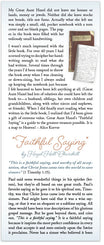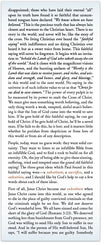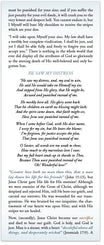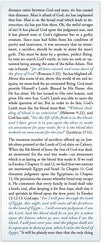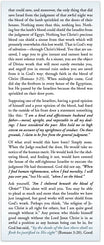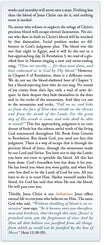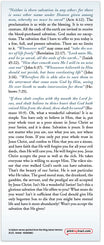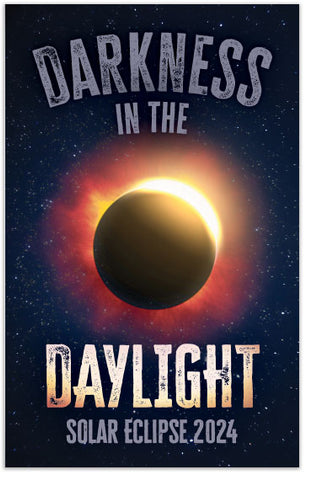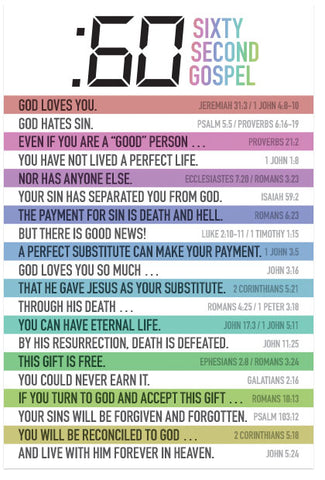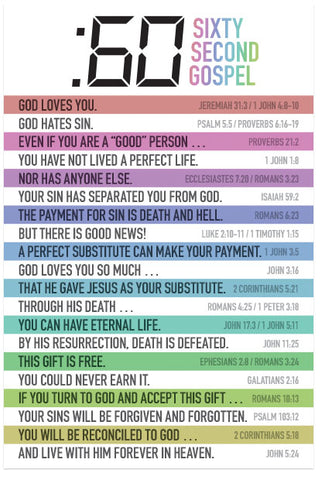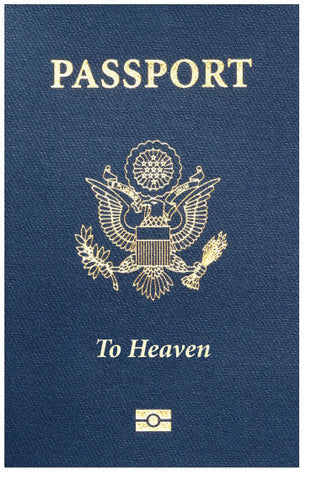My Great Aunt Hazel Left Me WHAT???
Special-Order Folded Flyer Tract
 NOTE: This item is custom-printed to order (click for more details).
NOTE: This item is custom-printed to order (click for more details).
This tract is from our print-on-demand library, and is not kept in stock. Select the options below, and we will custom-print a batch just for you. Because this item is custom-printed, you can add your custom imprint to the back page at no extra cost.
- Estimated shipping date: Thursday, December 4 (Click for more details)
- SKU:
- Discounts: Discount coupons do not apply to this item
- Format: Folded Flyer Tract
- Size: 3.5 inches x 8.5 inches
- Pages: 8
- Imprinting: Available with 3 lines of custom text
- Version: KJV
- Returns: Because this item is custom-printed to order, it cannot be returned.
Show all item details
The full text of this flyer tract is shown below in the KJV version. (Do you want to print this tract in a different version than the one listed? Contact us and let us know what you're looking for—we may be able to create the alternate version for you at no charge.)
My Great Aunt Hazel did not leave me houses or lands, money or jewels. Neither did she leave stocks nor bonds, title nor fame. Actually what she left me was simply a small, old, pocket notebook with a torn cover and no blank pages. The pages in the book were filled with her tediously small handwriting.
I wasn’t much impressed with the little book. For over 40 years I had scorned trying to decipher her handwriting enough to read what she had written. Several times through the years I’d been tempted to throw the book away when I was cleaning or down-sizing, but I always ended up keeping the notebook just because I felt honored to have been left anything at all. (Great Aunt Hazel had lots of relatives she could have left the book to—a husband, siblings, her own children and grandchildren, along with other nieces and nephews, or friends). When I did finally start reading what was written in the little book, I realized that I’d been given a gift of extreme value. Great Aunt Hazel’s “Faithful Saying” is a guide to the greatest treasure possible. It is a map to Heaven! ~ Alice Korver
“Faithful Saying”
by Hazel Hall Churchill
“This is a faithful saying, and worthy of all acceptation, that Christ Jesus came into the world to save sinners” (1 Timothy 1:15).
Paul said some wonderful things in his epistles (letters), but they’re all based on one great truth. Paul’s favorite saying as he gave it to his spiritual son, Timothy, was that Christ Jesus came into the world to save sinners. Paul might have said that it was a wise saying, or that it was an eloquent or a sublime saying. All these would have been true descriptions of his glorious gospel message. But he goes beyond them, and cries out, “This is a faithful saying.” It is a faithful saying because it inspires the most perfect confidence in every soul that accepts it and rests entirely upon the Savior it proclaims. Never has a sinner who believed it been disappointed; those who have laid their eternal “all” upon its truth have found it so faithful that unnumbered tongues have declared “We know whom we have believed.” This is the precious truth that has always lain closest and warmest to the Christian heart. There is no story in the world, and never will be, like the story of the cross. No living Christian ever heard the “faithful saying” with indifference and no dying Christian ever heard it but as a sweet voice from home. This faithful saying will never be forgotten. It begins with an invitation to “behold the Lamb of God who taketh away the sin of the world.” And it closes with the magnificent visions of Heaven, and the bursting anthem of “Worthy is the Lamb that was slain to receive power, and riches, and wisdom and strength, and honor, and glory, and blessings,” in this world and in the next world. No saying in the universe is of such infinite value to us as that “Christ Jesus died to save sinners.” The power of every pulpit is to be measured by its power to exalt the Cross of Christ. We must give men something worth believing, and the only thing worth a weak, tempted, sinful man’s believing is that the Son of God came into the world to save him. If he gets hold of this faithful saying, he can get hold of Christ; if he gets hold of Christ, he’ll be a saved man. If he fails to do this, he is lost; and it matters little whether he perishes from skepticism or from love of this world or from sin of any description.
People, today, want no guess work: they want solid certainty. They want to listen to an infallible Bible from an infallible God, and to find a rock to build on for all eternity. Oh, the joy of being able to give these sinning, suffering, tried and tempted ones the grand old faithful saying! The three great ideas which Paul found in this faithful saying were—a substitute, a sacrifice, and a salvation, and I should like by God’s help to say a few words about each of these ideas.
First of all, Jesus Christ became our substitute when Jesus Christ came into this world, as one who agreed to die in the place of guilty convicted criminals so that the criminals might be set free. We did not deserve God’s wonderful love. We all have sinned and come far short of the glory of God (Romans 3:23). We deserved nothing less than banishment from God’s presence, yet God was willing to send His only Son to suffer in our stead. And in the person of His well-beloved Son, He says, “I will suffer because you are guilty. Somebody must be punished for your sins; and if you suffer the just penalty for your evil deeds, it will crush you to the very lowest and deepest hell. You cannot endure it, but I Myself will bare My shoulders to receive the stripes which are your due.
“I will take upon Myself your sins. My law shall have a terrible but complete vindication. I shall be just, and yet I shall be able fully and freely to forgive you and accept you.” There is nothing in the whole world that ever did display all the attributes of God so gloriously as the atoning death of His well-beloved and only begotten Son.
HE SAW MY DISTRESS
“He saw my distress, and, my soul to win,
He said He would take on Himself my sin;
And stepped from His glory, that He might be,
Accused and punished instead of me.
He meekly bore all. His glory went back.
That his children on earth no blessing might lack;
And the spirit came down, that faith might see,
How Jesus was punished instead of me.
When I come before God, with His dear name,
I weep for my sin, but He bears the blame;
I’m forgiven, for justice accepts the plea,
That Jesus was punished instead of me.
O Savior, all words are too weak to show,
How much to thy marvelous love I owe;
But my full heart sends up its thanks to Thee,
Because Thou wast punished instead of me
Oh! Wonderful love!”
“Greater love hath no man than this, that a man lay down his life for his friends” (John 15:13), but Jesus Christ gave His life for His enemies! Although we were enemies of the Cross of Christ, although we despised and rejected Him, still He bore our griefs, and carried our sorrows; He was wounded for our transgressions. He was bruised for our iniquities; the chastisement of our hearts was upon Him; and with His stripes we are healed.
Now, (secondly), Jesus Christ became our sacrifice and died to bear our guilt. God is holy, and God is just. Man is a sinner, with a heart “deceitful above all things, and desperately wicked” (Jeremiah 17:9). A distance exists between God and man; sin has caused that distance. Man is afraid of God; sin has implanted that fear. Man is on the broad road which leads to destruction; sin has put him there. Oh, the awful ravages of sin! It has placed God upon the judgment seat, and it has placed man at God’s righteous bar as a guilty creature. Since man had fallen from his condition of purity and innocence, it was necessary that an atonement, a sacrifice, should be made to atone for man’s guilt. This must be done by a spotless, perfect Being. In vain we search God’s earth, in vain we seek an untainted being among the sons of the fallen Adam. Not one is found; “for all have sinned, and come short of the glory of God” (Romans 3:23). Sin has blighted all. Above this scene of sin, above this world of sin and iniquity, we must look for an untainted Being. God must provide Himself a Lamb. Blessed be His Name, this He has done. He has turned to His own bosom, and given His own Son. God’s Lamb was able to meet the whole question of sin. But in order to do this, God’s Lamb must die, for blood must flow. “Without shedding of blood is no remission” (Hebrews 9:22), and God has said, “For the life of the flesh is in the blood: and I have given it to you upon the altar to make an atonement for your souls: for it is the blood that maketh an atonement for the soul” (Leviticus 17:11).
The immense number of sacrifices offered up on Jewish altars pointed to the Lamb of God slain on Calvary. When the life-blood of Jesus the Son of God was shed, an atonement for the soul was made—an atonement which is as lasting as the blood that made it. If we read in Exodus, Chapters 11 and 12, we find that two nations are mentioned: Egypt and Israel. In Chapter 11, God threatens judgment upon the Egyptians; in Chapter 12, He proclaims the means whereby Israel may escape it. He comments that every family in Israel shall take a lamb, and, after keeping it for four days, shall slay it and sprinkle its blood upon the door posts. In Exodus 12:12-13. God says, “For I will pass through the land of Egypt, this night, and will smite all the firstborn in the land of Egypt… I will execute judgment: I am the Lord. And the blood shall be to you for a token upon the houses where ye are: and when I see the blood, I will pass over you, and the plague shall not be upon you to destroy you, when I smite the land of Egypt.” It will be plainly seen then that the only thing that could save, and moreover, the only thing that did save Israel from the judgment of that awful night was the blood of the lamb sprinkled on the doors of their houses. Nothing more than this, nothing less. Nothing but the lamb’s blood could shield the Israelite from the judgment of Egypt. Nothing but Christ’s precious blood can shield a sinner from that wrath which will presently overwhelm this lost world. That is God’s way of salvation—through Christ’s blood. You that are unsaved, I urge you to give instant and earnest heed to this most solemn truth. As a sinner, you are the object of Divine wrath that will most surely overtake you, and engulf you in eternal ruin unless you are saved from it in God’s way: through faith in the blood of Christ (Romans 3:25). When midnight came, God did slay the firstborn in every house of the Egyptians, but He passed by the Israelites because the blood was sprinkled on their door posts.
Supposing one of the Israelites, having a good opinion of himself and a poor opinion of the blood, had fixed to the outside of his front door a statement something like this: “I am a kind and affectionate husband and father—moral, upright, and respectable in all my dealings. I have considered the poor. Men hold me in high esteem on account of my uprightness of conduct. On these grounds, I claim to be free from the general judgment.”
Of what avail would this have been? Simply none. When the Judge reached the door, He would take no notice of the human merit. He would look for the sheltering blood, and finding it not, would have entered the house of the self-righteous Israelite to execute the judgment He had threatened. God did not say, “When I find human righteousness, when I find morality, I will pass over you,” but He said, “when I see the blood.”
Ask yourself, “Am I sheltered beneath the blood of Christ?” This alone will avail you. You may be able to plead as much and more than the Israelite we have just imagined, but good works will never shield from God’s wrath. Perhaps you think, “the religion of Jesus Christ is all right for others, but I am quite good enough without it.” Any person who thinks himself good enough without the Lord Jesus Christ is in as awful a position as any human being can be in, for God has said, “by the deeds of the law there shall no flesh be justified in His sight” (Romans 3:20). Good works and morality will never save a man. Nothing less than the blood of Jesus Christ can do it, and nothing more is needed.
No sinner who refuses or neglects the refuge of Christ’s precious blood will escape eternal damnation. No sinner who flees in faith to Christ’s blood will be touched by that damnation. Social position makes no difference in God’s judgment plan. The blood was the test that night in Egypt, and it will be the test in a fast-approaching day. In Revelation 5, we read of a glorified host in Heaven singing a new and never-ending song, “Thou art worthy … for thou wast slain, and hast redeemed us to God by Thy blood.” However, in Chapter 6 of Revelation, there is a different scene. We do not see the blood-sheltered host of Chapter 5, but a blood-rejecting host who do not sing. No sound of joy comes from their lips, only a wail of utter despair. In their despair they hide themselves in the dens and in the rocks of the mountains. And they cry out to the mountains and rocks, “Fall on us, and hide us from the face of Him that sitteth on the throne and from the wrath of the Lamb: For the great day of His wrath is come; and who shall be able to stand?” This fast approaching judgment is no vain dream of fools but the solemn awful truth of the living God announced throughout His Book from Genesis to Revelation. But thank God, you need not face this judgment. There is a way of escape that is through the precious blood of Jesus, through the atonement made by our Lord and Savior. You have not to slay the Lamb; you have not even to sprinkle the blood. All this has been done. God’s boundless love has done it for you. He has loved you when you were guilty, and when His own Son died to be the Lamb of God for you. All you have to do is to trust Him. Shelter yourself under His blood, for God has said that when He sees the blood, He will pass over you.
Thirdly, Jesus Christ is our Salvation: Jesus offers eternal life to everyone who believes on Him. The same God who said, “Without shedding of blood is no remission” now says, “Be it known unto you therefore, men and brethren, that through this man [Jesus] is preached unto you the forgiveness of sins: And by Him all that believe are justified from all things, from which ye could not be justified by the law of Moses” (Acts 13:38-39).
“Neither is there salvation in any other: for there is none other name under Heaven given among men, whereby we must be saved” (Acts 4:12). The proclamation is as wide as the blessing. It is to every creature. All the ends of the earth are invited to receive the blood-purchased salvation. God makes no exceptions. The salvation that I have to offer to you today is a free, full, and present salvation. There are no limits to it. “Whosoever will” may come and “take the water of life freely” (Revelation 22:17). “Look unto Me, and be ye saved, all the ends of the earth...” (Isaiah 45:22). “Him that cometh unto Me I will in no wise cast out” (John 6:37). “Whosoever believeth in Him should not perish, but have everlasting life” (John 3:16). “Wherefore He is able also to save them to the uttermost that come unto God by Him, seeing He ever liveth to make intercession for them” (Hebrews 7:25).
“If thou shalt confess with thy mouth the Lord Jesus, and shalt believe in thine heart that God hath raised Him from the dead, thou shalt be saved” (Romans 10:9). Oh, what a wonderful salvation! It is so simple. You have only to believe in Him, that is, put your whole trust as a poor sinner in Jesus Christ as your Savior, and it is done. Salvation is yours. It does not matter who you are, nor what you are, nor where you come from. If you only put your whole trust in Jesus Christ, and confess to Him that you are a sinner, and have faith that He will forgive you for all your evil deeds, then He will save you. He will forgive you. Jesus Christ accepts the poor as well as the rich. He takes everyone who is willing to accept Him. The vilest sinner that ever walked God’s earth can have salvation. That’s the beauty of our Savior. He is not particular who He takes. The good moral man, the drunkard, the gambler, the servant, and the prodigal are all accepted by Jesus Christ. Isn’t He a wonderful Savior? Isn’t this a glorious salvation that He offers to you? What more do you want? Isn’t it sufficient that God should give His only begotten Son to die that you might have eternal life and have it more abundantly? Won’t you accept the salvation that He gives?



